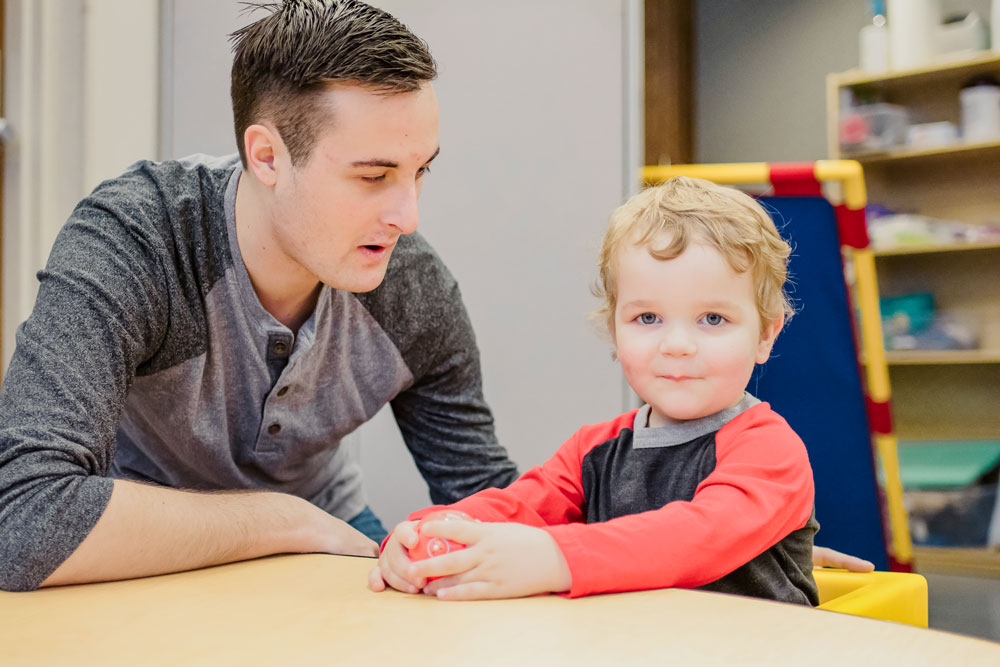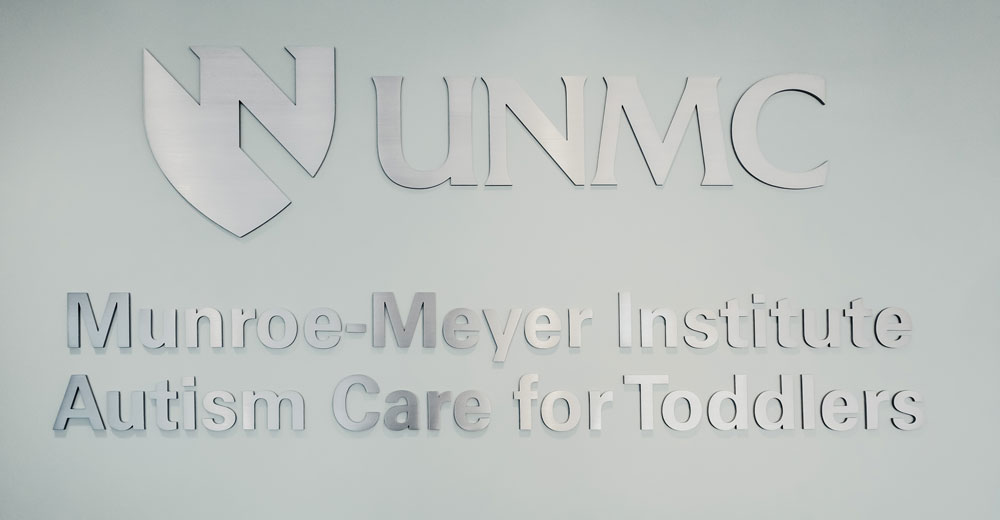Munroe-Meyer Institute Providing Midland ABA Students with Real-life Experiences
If Grace Staley had any doubts about the career she had chosen, her practicum through the Munroe-Meyer Institute solidified her decision.


A senior Applied Behavior Analysis major at Midland University, Grace, like many other students, has had the opportunity to get a closer look at what her career would be like through a practicum at the Munroe-Meyer Institute in Omaha.
“The most important thing I have discovered from being at MMI this year is that I have chosen the right career path,” Staley said. “Before beginning my practicum, I wasn’t 100 percent sure that ABA was going to be the right fit for me as I had no hands-on experience and was unsure of what to expect. Going through my practicum, I know this is what I’m supposed to be doing. Being able to work with this specific population of children is something so special and rewarding. I love seeing their progress and getting to know them.”
Midland University and the Munroe-Meyer Institute have been in partnership since Midland instituted ABA as a minor in 2007, and that partnership has remained strong over the years. Midland added ABA as a major prior to the 2021-22 academic year. Once students have completed their practicum and earned their Bachelor’s degree, they are eligible to become a Board Certified Assistant Behavior Analyst.
The Munroe-Meyer Institute (MMI) is an academic unit located within the University of Nebraska Medical Center. Professional staff members at MMI are organized within disciplines that include Psychology, Special Education, Clinical Genetics, Developmental Medicine, Occupational Therapy, Physical Therapy, Speech Pathology, Social Work, Recreation Therapy, Nutrition, Nursing, Genetics Laboratories, Severe Behavior, Pediatric Feeding Disorders, and the Integrated Center for Autism Spectrum Disorders.
“Since we started the ABA program, it has been invaluable for our students to have a site where they can complete practicum hours,” Dr. Connie Taylor, Professor of Psychology at Midland, said. “It’s really been beneficial for both of us. Our students are gaining real-life experience and getting to learn from great professors and advisors. But Munroe-Meyer has benefitted as well because our students are coming in with foundational knowledge most undergraduate students don’t have. We have had numerous students who gained employment through Munroe-Meyer, or used that experience to pursue a Master’s degree. We are so grateful they have been willing to work with us over the years.”
Lance Myers ‘23, is one of those students who gained full-time employment at MMI following graduation. He believes the experience he gained during his practicum has provided him a wealth of knowledge as he advances to the next level of his career. “I use nearly everything I learned on a daily basis and it wasn’t until I started my practicum that some of the concepts we were learning truly made sense,” he said. “Seeing behaviors occurring, and having the background to understand why they were occurring, has been incredibly beneficial to me.”
Students entering their senior year, who are ABA majors, are required to work 24 hours per week as part of their practicum. Students will work at MMI during both the fall and spring semesters, and some may begin the practicums in the summer before their senior year to be sure they get the required hours. Students are paid for their work at MMI.
“They offer flexibility in the schedules because they want to support the students who are athletes or are involved in other activities,” Taylor said.
At the start of their practicums, students will shadow other professionals, and while the mentoring and supervision will continue throughout their tenure, they will have clients they will work with on their own. “There is a lot of supervision and mentoring and we love that aspect,” Taylor said. “Our students become very close with their clients and they love seeing the progress they make. That’s what is reinforcing for them.”
There are three clinic options for students to choose from and they will attend a different clinic each semester. “We work with them to get them into the clinic of their choice, but I make sure they work at two different clinics,” Taylor said. “Having them work at two different clinics allows them to get a bigger view, broaden their skills, and make them more marketable.”
Clinic options are Early Intervention Clinic (young children with autism), Severe Behavior Disorders (older children with challenging behaviors), and Feeding Disorders (children who are working to become age-appropriate eaters). Patients at these clinics range from ages 3-21.
Garrett Regan, a senior ABA major, said experiencing multiple clinics has provided him with options as he moves toward a career. “Through this practicum, I have gained experience in two different clinics, both of which I have enjoyed,” he said. “This will help me as I begin my career in the field as I will not be restricted to looking for one form of ABA practices.”
Taylor said the practicum could become even more accessible for students as a new ACT Clinic (Autism Care for Toddlers) is set to open in Fremont in the fall of 2024. “We’re excited for the new clinic, which we believe will open up even more opportunities for our students,” she said.
Staley has been able to translate what she has learned in the classroom into being an effective instructor at Munroe-Meyer. “This experience has expanded my knowledge because I have been able to connect what I have learned in the classroom to real life experiences,” she said. “I love being able to apply things I have read about and studied in my ABA courses into my practicum. I feel like everyday I learn something new from my supervisors, co-workers, or my clients.”
Taylor takes a group of psychology students to Munroe Meyer for a field trip each spring. “We used to only take juniors who were planning on an internship, but over the last couple of years, we’ve seen the value in taking any student interested,” she said. “Allowing them to see what these clinics and interactions are like is so valuable.”
Myers believes getting to utilize what you have learned in the classroom is one the most valuable resources a student can gain, and encourages ABA students to make the most of their opportunities. “The practicum portion of the ABA major was the most impactful thing that happened to me at Midland,” he said. “Any practicum experience is a great opportunity to see what your future career could look like. My supervisors from my practicum experience still give me advice and answer questions. It was a great way to network and now I have lifelong mentors I can go to for any questions.”
Regan is grateful for the opportunity to hone his skills at MMI and is looking forward to applying what he has learned to his career. “MMI has taught me to apply the principles I have learned through a clinical setting,” he said. “Outside of pure ABA processes, I have become an effective communicator, as well as being a better collaborator and team member. Midland first put me onto ABA, but this practicum has solidified that this is something I want to pursue throughout my life. This experience has shaped my future.”
